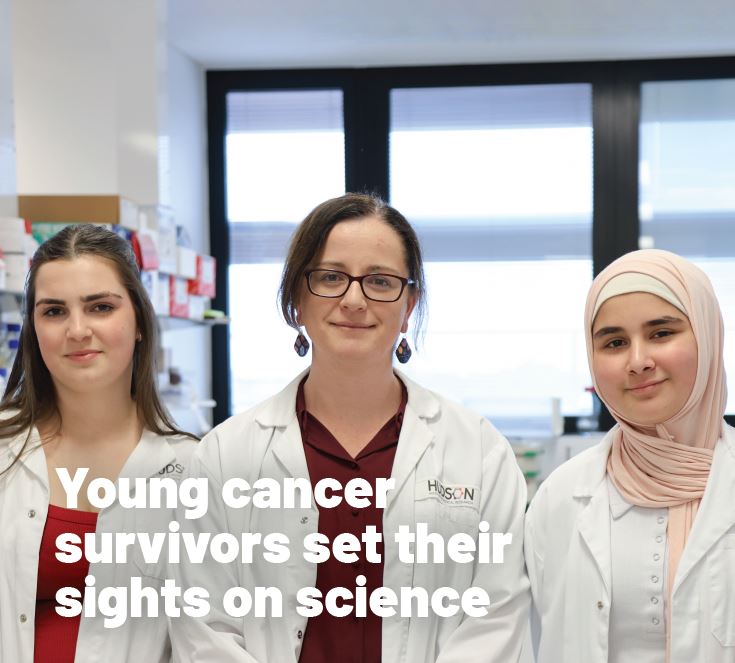Flicking the immune ‘switch’ to repair multiple sclerosis damage
By Hudson Institute communications

Discovering new treatments to repair damage to nerve cells caused by Multiple Sclerosis (MS) will be the focus of research at Hudson Institute of Medical Research, thanks to funding from MS Research Australia.
Dr Claire McCoy has been awarded a $25,000 MS Research Australia incubator grant to progress her research into the role of macrophages, an immune cell population that migrate in large numbers to the brain in multiple sclerosis.
Symptoms may be debilitating and can include including loss of co-ordination, speech difficulties, extreme fatigue, memory loss and continence problems.
Dr McCoy says that depending on the circumstances, macrophages (immune cells found in white blood cells) behave like ‘Jekyll and Hyde’ in multiple sclerosis.
What is multiple sclerosis?
- Multiple sclerosis is a progressive and degenerative disease affecting the central nervous system.
- It occurs when the immune system mistakenly attacks the nerve cells in the brain and spinal cord that transmit messages from the brain throughout the body.
- MS affects 2.3 million people worldwide, including 23,000 Australians. It normally strikes in young adults, with many people diagnosed between the ages of 20 and 40.
“In MS, the body’s immune system attacks the myelin, a protective coating that surrounds nerve fibres in the brain and allows them to send messages quickly and efficiently,” Research Scientist in the Cancer and Innate Immunity Group at Hudson Institute, Dr McCoy said.
“When this ‘insulation’ or coating is attacked, nerve cells in the brain are left exposed to the ‘elements’, leading to damage and then scarring which renders the nerve cells unable to communicate messages properly and at risk of degeneration. Depending on their environment, macrophages can switch between destroying myelin or repairing this fatty layer that surrounds the nerve cells, in a process known as re-myelination.”
Taking control of the lever
Dr McCoy believes the ‘switch’ that changes the behaviour of these macrophages may lie in a particular molecule called miR-155, which controls our immune responses to infection. In a new review, just published in the journal Advances in Experimental Medicine and Biology, Dr McCoy describes how miR-155 has real-world potential as a diagnostic, prognostic and therapeutic target for MS.
“Our aim is to understand how miR-155 might ‘switch off’ the destructive effects of macrophages and take control of this ‘lever’. We hope to identify a new therapeutic target that may enable the body to promote repair of the damage caused by MS, potentially reversing the effects of the disease.”
MS Research Australia CEO, Dr Matthew Miles said, “MS Research Australia has partnered with The Trish MS Research Foundation to fund this important research. Investigations on how to promote myelin repair are a critical priority for people with MS, and we look forward to seeing the outcomes of this important line of research.”
Dr McCoy says that compared with other immune cell types, macrophages are understudied in MS, but are emerging as a new wave of therapeutics in a range of other diseases.
“Up to 75 per cent of people diagnosed with MS are young adults between the ages of 20 and 40 and it can have a dramatic impact on their quality of life, career opportunities and family planning,” said Dr McCoy.
“What is needed is a treatment that can repair damage to neurons to stop disease progression. While it is early days, I do believe microRNAs have enormous therapeutic potential in MS.”
Journal | Advances in Experimental Medicine and Biology
Title | miR-155 Dysregulation and Therapeutic Intervention in Multiple Sclerosis
View publication | https://doi.org/10.1007/978-981-10-5987-2_5
In this article
About Hudson Institute
Hudson Institute’ s research programs deliver in three areas of medical need – inflammation, cancer, women’s and newborn health. More
Hudson News
Get the inside view on discoveries and patient stories
“Thank you Hudson Institute researchers. Your work brings such hope to all women with ovarian cancer knowing that potentially women in the future won't have to go through what we have!”


